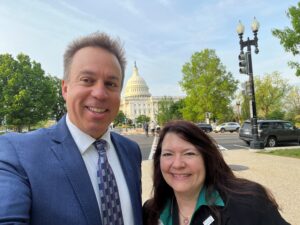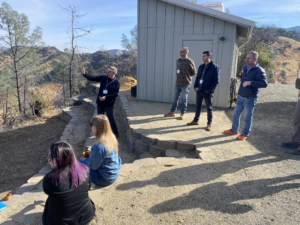Advocacy
Biological field stations and marine labs are governed from many angles: campus administrators, surrounding land managers, and local, regional, and national governments. Field stations as institutions of research and education depend heavily on government funding and support. Thus, how biological field stations advocate and position themselves in the larger regulatory and governmental landscape have important consequences for research flexibility and sustainable operations.
In the United States, the “CHIPS and Science Act of 2022” outlined how the National Science Foundation must support field stations and marine laboratories. Building off this federal recognition of field station’s value, the OBFS Outreach & Communications Committee helps empowers OBFS members to engage and advocate for their own field station, and all field stations across the globe. Some opportunities and resources for OBFS members include the following:

Brian Kloeppel (Left) of Western Carolina University and Sarah Oktay of the Herring Gut Coastal Science Center representing OBFS at the 2024 AIBS Congressional Visits Day where they met with 15 different elected leaders on Capitol Hill
- AIBS Congressional Visit Day: OBFS collaborates with the American Institute of Biological Sciences (AIBS) annually to sponsor a few OBFS members to an in-person training and engagement opportunity on Capitol Hill in Washington D.C. The call for OBFS participants goes out to the OBFS listserv around February each year for the late-April trip to D.C.
- AIBS District Visits: Instead of traveling to DC to advocate and communicate for biological field stations and marine labs, the district visits is an opportunity to engage policymakers at your field station! This helps showcase the value and impact of your station and foster these important relationships. While you can host policymakers at anytime, AIBS and OBFS can help you organize and prepare for hosting these meetings during the Summer Congressional Recess (around August-early September). The call for participants goes out to the OBFS listserv around late-May each year.
- Toolkit for Biological Field Stations Engaging with Policymakers: a resource for OBFS members to more easily access tools and materials to learn about and engage with policymakers on local and national levels.
- Field Stations Fact Sheet: A one-page infographic useful to leave after meetings with a diversity of policymakers and stakeholders to communicate critical information about biological field stations. We encourage you to make one for your own field station too!
Further, biological field stations overlap with many stakeholders, from land managers to the general public. Field stations are important places to foster partnerships and build trust in biological and environmental sciences. While every field station communicates on a localized level in ways unique to their stakeholders, the OBFS Outreach & Communications Committee publishes a quarterly newsletter to the organization’s various stakeholders: the OBFS community (station directors, staff, OBFS station representatives), affiliates at partnering institutions (NSF, AIBS, LTER, ESA), decision-makers (congressional staff, local officials, and regulatory agencies), donors to OBFS, and station visitors. Check out the latest newsletter here!

Quail Ridge Reserve Director Ross Brennan shows California State Lawmakers around the station (which is part of the University of California's Natural Reserve System)
OBFS also encourages and supports members hosting policymakers and state and local leaders at their field stations. Hosting policymakers is a hands-on and immersive way to communicate the value of field stations for science and education. For example, UC Davis's Quail Ridge Reserve recently hosted California State Lawmakers to raise general awareness of the strategic value of the University of California Natural Reserve System (UCNRS). In collaboration with the UCNRS and UC Government Relations, this event also served as a catalyst for the lawmakers to support a state bond measure that would include an earmark for land acquisition and facility improvements for the UCNRS.
Contact the Chair of the Outreach & Communications Committee (connerphilson@gmail.com) for more ways to get engaged in field station communications and advocacy or if you're interested in developing advocacy materials for your station or hosting policymakers!
OBFS Advocacy in the Media
- Brian Kloeppel interviewed on Capitol Hill durring the 2024 AIBS Congressional Visit Day (link)
- BioScience Talks podcast episode about OBFS and the value of field stations with OBFS Presidents past and present Lara Roketenetz, Rhonda Struminger, and Chris Lorentz (link)
- Conner Philson and Rebecca Kauten interviewed about OBFS and field stations by the BioScience Talks podcast durring the 2023 AIBS Congressional Visit Day (link)
